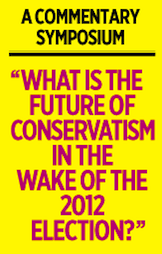 If the outcome of the latest presidential election has you searching for lessons conservatives can learn and apply to future contests, the latest issue of Commentary offers 53. That’s the number of conservative, neoconservative, and libertarian commentators participating in the magazine’s symposium on the future of conservatism. Most participants offer useful advice. Yuval Levin‘s observations struck this observer as especially interesting.
If the outcome of the latest presidential election has you searching for lessons conservatives can learn and apply to future contests, the latest issue of Commentary offers 53. That’s the number of conservative, neoconservative, and libertarian commentators participating in the magazine’s symposium on the future of conservatism. Most participants offer useful advice. Yuval Levin‘s observations struck this observer as especially interesting.
Do we preserve the structure of the Great Society welfare state, or do we preserve the promise of American prosperity and freedom? It increasingly looks like we cannot do both.
The Democratic Party has made its choice. It believes the solution to the collapse of the postwar welfare state and the slowing of the American economy is more of the same. It would rather see American life dramatically altered (with a significantly larger government, a smaller ad less active civil society, and a more consolidated but less dynamic economy) than see our governing institutions reformed. Conservatives will need to clarify the alternative by articulating an agenda to reform the structure of key government programs for the sake of preserving the structure of American society and the preconditions for our way of life.
The goal of these reforms is hardly radical: an economy growing at roughly its postwar pace, a federal government of roughly its postwar size and functions, and an energetic and flourishing civil society filled with countless civic, religious, and fraternal, corporate, and charitable entities performing a vast array of social functions. That is the America we have known, but allowing it to persist will require bold reforms of government programs that capitalize on the efficiency of the market economy.
In the next four years, as a result of the public’s poor choice in this fall’s presidential election, this task will largely call for a stance of resistance, combined with efforts to make incremental gains through modest structural reforms of the tax and entitlement systems as opportunities for responsibly political compromises present themselves. Not much will be accomplished. But conservatives must also use this time to fill in the policy agenda and the arsenal of arguments in favor of the brand of reforms that will prove essential in the long run.


